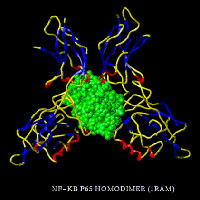New findings offer hope for MS sufferers
Researchers have found a signalling molecule that aggravates the symptoms of multiple sclerosis (MS) and which could be a target for new therapies of this debilitating disease. MS is one of the most common diseases of the central nervous system. Our nerve cells are surrounded by a protective, insulating layer of lipids and proteins called myelin, which helps our nerves to transmit signals quickly and efficiently. In MS sufferers, the body's immune system destroys the myelin, thereby disrupting the ability of the nerve cells to transmit signals effectively. Symptoms of MS include depression, coordination and speech problems, muscle weakness and disability. According to the European MS Platform, over half a million people in the EU have the disease, and it is the most common cause of disability in young adults. The causes of the disease are still not fully understood, and this latest research, which was coordinated by the European Molecular Biology Laboratory, looks at the role of a signalling molecule called NF-kB. The researchers' findings are published in the journal Nature Immunology. 'We have known for a long time that NF-kB is crucially involved in MS, but until now it was not clear if it was friend or foe,' said Manolis Pasparakis, Professor of Genetics at the University of Cologne. 'We were not sure whether it protects the brain cells against the consequences of the disease or actually aggravates the damage.' NF-kB is activated by two proteins called IKK2 and NEMO. Professor Pasparakis and his colleagues looked at what happened to mice with a condition similar to MS but whose brain cells did not produce IKK2 and NEMO. The scientists found that these mice had much milder MS symptoms than normal and had less inflammation of the central nervous system. According to the researchers, this is likely to be linked to the lower amount of inflammatory messengers produced by the brain cells. 'NF-kB regulates the production of messengers that are released during inflammation to recruit and activate immune cells,' explained Marco Prinz of the University of Gottingen. 'Generally this is a good strategy to protect the body from infections. But in MS it is exactly these immune cells that cause the problem and their hyperactivation through NF-kB only makes the situation worse.' In the mice studied, blocking IKK2 and NEMO meant the NF-kB signal was not activated and so it was unable to recruit immune cells which would go on to attack the myelin sheaths of the nerve cells. This makes the proteins good potential drug targets. The researchers hope that as the human NF-kB signalling pathway is similar to that of mice, the compounds that block IKK2 and NEMO in mice could also be effective in humans.



